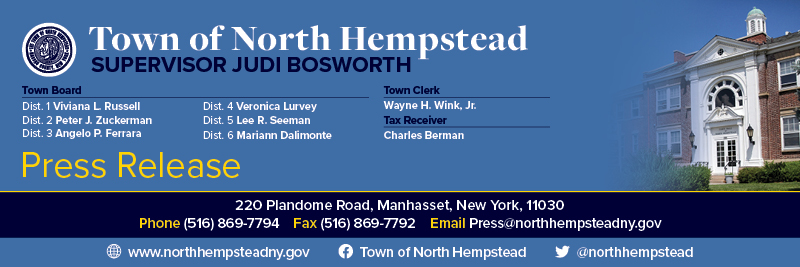
FOR IMMEDIATE RELEASE: May 20, 2021
MEDIA CONTACTS: Gordon Tepper, Rebecca Cheng, Matthew Leonenko and Michael Anderson | (516) 869-7794
Town Reminds Residents How to Reduce Stormwater Pollution
North Hempstead, NY – North Hempstead Town Supervisor Judi Bosworth and the Town Board would like to remind residents how to prevent and reduce stormwater pollution by providing some helpful tips.
Stormwater is the result of the water from rain or melting snow that flows into drainage infrastructure, like storm drains and catch basins. This untreated water does not absorb into the ground, but instead migrates into our local waterways and streams. Untreated stormwater can carry debris and pollutants which can lead to the destruction of aquatic life and habitats and even impact the health of our drinking water.
“It is so important for residents to understand the impact that stormwater pollution can have on our local environment,” said Supervisor Judi Bosworth. “Stormwater runoff can lead to harmful conditions for wildlife and negatively impact the quality of our drinking water. It is easy to do your part to reduce stormwater runoff. Following some simple tips can help prevent pollutants and debris from entering our lakes, rivers, and waterways.”
Residential Stormwater Tips Include:
- Pick up after your dogs and properly dispose of pet waste; it should always be flushed or wrapped and disposed of in garbage.
- Dispose of household hazardous waste such as paints and fertilizers at one of the Town’s S.T.O.P. (Stop Throwing Out Pollutant) events.
- Did you know that that the detergent from washing your car can lead to algae bloom, killing fish and other marine life in our waterways? Safe alternatives include washing your car on your lawn to prevent runoff or taking it to a car wash where water is reclaimed or treated.
- Minimize the use of synthetic pesticides and fertilizers whenever possible. Be sure to follow the instructions on the packages to prevent excess usage and consider replacing your turf yard with native plants (which require minimal chemicals and watering).
- Never litter! All man-made garbage, especially cigarette butts, creates a risk to wildlife and leaches chemicals into the environment. Do not sweep garbage into storm drains as it also blocks the drains and can create flood risks.
- Consider making a rain garden on your property, so that stormwater can filter slowly into the ground instead of rushing into the street. Rain gardens also provide food and habitat for wildlife and help recharge and purify our drinking water supplies.
